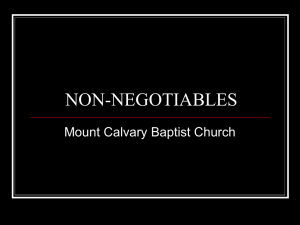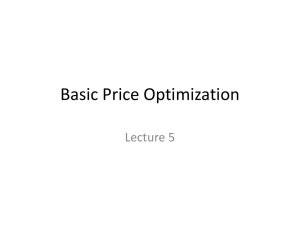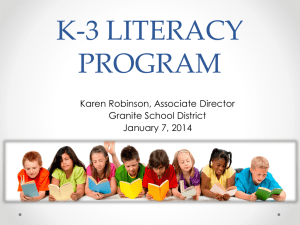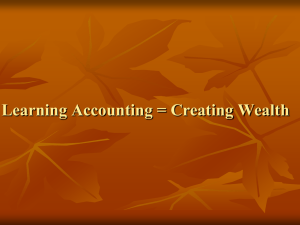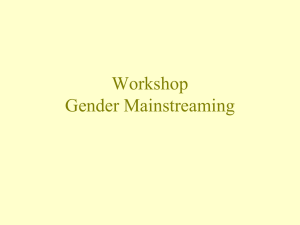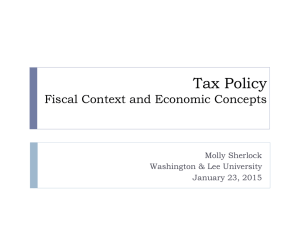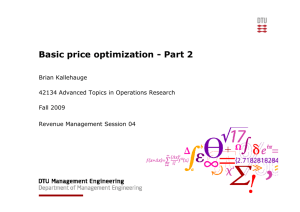September 24, 2012 - Champaign Unit 4 Schools
advertisement
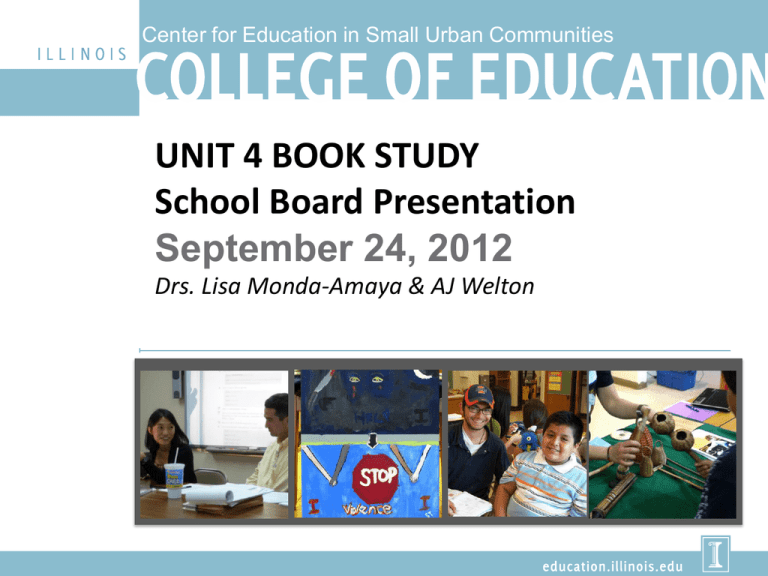
Center for Education in Small Urban Communities UNIT 4 BOOK STUDY School Board Presentation September 24, 2012 Drs. Lisa Monda-Amaya & AJ Welton Center for Education in Small Urban Communities Marzano, R.J. & Waters, T. (2009). District leadership that works: Striking the right balance. Center for Education in Small Urban Communities Purpose of book study Premise of book & discussions • Discuss how district leadership drives student achievement • Emphasis on strong communication- especially with the school board • Determine principles for effective instruction & assessment • Establish “non-negotiables” for instruction and achievement • Identify instructional and assessment frameworks • Define what social justice leadership means in Unit 4 • Develop action plans & top priorities for Unit 4 Session 1: District Leadership Matters • Discussion questions – How do we define leadership in Unit 4? – How should Unit 4 define leadership with a social justice lens Center for Education in Small Urban Communities Session 1: District Leadership Matters Summary of Priorities • Build consensus on district goals • Clearly communicate district goals • Shared accountability • Monitor effective instruction • Professional development and support for teachers “Student achievement and social justice are non-negotiable.” Session 1: Defining Leadership in Unit 4 FINDINGS • Transitional time from a more top-down approach (“chain of command” to “open flow”) • District leadership more transparent now • Still uncertainty in who would be considered leaders in district “The leader is a good listener, leads by example, a strong communicator, proactive, a collaborator, and reflective.” Session 2: Setting non-negotiables for achievement & instruction Dr. Wiegand defined the district “non-negotiables” for achievement & assessment Discussion Questions • Based on Dr. Weigand’s non-negotiables for achievement and assessment, what non-negotiables should be added? At least one recommendation should discuss equity • What are the holes or areas of improvement for achievement and how should they be addressed? Session 2: Setting non-negotiables for achievement & instruction Sample FINDINGS & SUMMARY OF PRIORITIES • District must clearly define non-negotiables • Professional development and support for teachers (workshops, discuss equity, knowledge of work of master teachers) • Knowledge of the standards (Common Core) Session 2: Setting non-negotiables for achievement & instruction Sample FINDINGS & SUMMARY OF PRIORITIES • Student needs (meeting basic needs, responsive to students, based on individual achievement) • Define acceptable student growth • Equity in assessment (“all means all”, “equal not always the same-same not always equal”) • Bringing people together (discuss report cards, progress toward standards, everyone on the same page) Session 3: Collaborative goal setting, board alignment, & allocation of resources Discussion questions What should the board do to help us move forward in establishing our nonnegotiable goals for achievement and instruction? 1. What is it the Board needs to understand about equity and the allocation of resources in the School District? Action Item: How do we make the Board a more integral part of our work? Session 3: Collaborative goal setting, board alignment, & allocation of resources Sample Findings: Suggestions for Board moving forward • Serve as advocates for schools, teachers and students in the district • Building bridges between the schools and the community • Clear communication and transparency • Greater presence in buildings (spend “real time” with students and teachers; walkthroughs; conversations with teachers and principals) • Greater awareness Session 4: Discussion Questions • What should the teacher’s union (CFT) do to help us move forward in establishing our nonnegotiable goals for achievement and instruction? • Define social justice and challenging the status quo • Create district-wide action steps for summer, fall, and spring What should Union Do? • Be proactive in supporting collaboration with administration • Help establish and educate membership on “nonnegotiables” • Help define tools for moving forward • Unifying – open communication and dialogue Action Steps for Unit 4 2012-13 SUMMER • Common core – Plan of action for establishing goals, monitoring, implementation – Plan for collaboration regarding action steps and non-negotiables as well as common core standards • Social Justice & equity – Common understanding/definition – Funding allocations (equitable formula) with a social justice perspective – Safe places for discussion • Improve collaboration and sharing of information • Select model for the instructional framework • Administrators define central office goals Action Steps for Unit 4 2012-13 FALL • Develop growth measures and monitoring system for assessment (formative and summative) • Anchor standards for common core (assessment) • Follow up on social justice discussions and definitions • Open dialogues and collaborations • Plan professional development around assessment and common core Action Steps for Unit 4 2012-13 SPRING • Redesign report cards (Marzano/ common core) • Reevaluate and reflect on growth plan • Revisit goals and non-negotiables • Review accomplished action steps • Reevaluate implementation plan for common core standards • Facilitate student self-evaluation of growth Center for Education in Small Urban Communities Please ask questions & share your thoughts… CONTACT INFORMATION Dr. Lisa Monda-Amaya lmonda@illinois.edu Dr. AJ Welton ajwelton@illinois.edu
